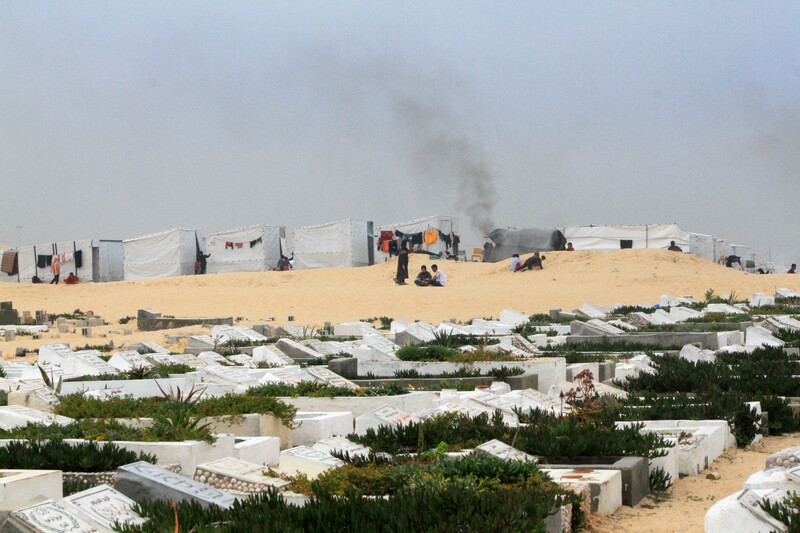The Electronic Intifada 1 March 2024

Displaced people are now living beside a cemetery in Rafah, Gaza’s southernmost city.
APA imagesAhmad Hanoun and his extended family are now living on a poultry farm in Rafah, southern Gaza.
Their rudimentary shelter is not suitable accommodation for humans. But they have nowhere else to go.
There are so many others in a similar situation. About 1.3 million people – more than half of all Gaza’s inhabitants – are crammed into Rafah following mass displacement.
The Hanouns were forced to leave their home in the Sheikh Radwan neighborhood of Gaza City. Israel has repeatedly bombarded the area during the current genocidal war.
The farm where they are now living does not have a bathroom. To use one, they visit al-Helal al-Emirati, a maternity hospital in Rafah.
The family have arranged showers among the farm’s battery cages. They have boiled water on a wood fire before showering.
“We have to strip off in front of each other,” Ahmad Hanoun said. “There is no privacy during the war.”
The farm where they live smells terribly and they constantly have to contend with insects.
The children have experienced diarrhea.
Loay, a 7-year-old boy, has been diagnosed with Hepatitis A. His health is in a very serious condition.
When it rains heavily, the area where they live has been flooded by sewage, destroying blankets, mattresses and even food.
The family’s only protection during wet weather is to stay inside the cages.
“I find it unbelievable that we live in such filth,” said Ahmad Hanoun. “This is a place for animals and birds, not people. We had anticipated staying here for a few days until we found somewhere more suitable. But we haven’t managed to find anywhere else.”
Terrified
Adel Jumaa had to flee his home in Jabaliya refugee camp, northern Gaza, a few months ago.
First, he and his family went to Khan Younis in the south. Later, they moved to Rafah.
After seeking an apartment in Rafah, they realized that they could not afford the high rents being charged. They ended up assembling a tent on the grounds of a zoo owned by a relative.
That means they have to live beside animals who are starving.
A number of the lions in the zoo have already died since the war began. With food scarce, the zoo’s owner is trying to keep the remaining lions alive with bread.
The lions had previously eaten chicken. The zoo animals’ weight has fallen drastically.
The bathroom in the zoo is located close to the animals’ cages.
Adel’s 7-year-old son Rami is terrified of going to the bathroom after dark.
The boy started experiencing severe pains recently. When he was brought to hospital, he was diagnosed with kidney stones and required surgery.
A doctor told the family that such problems can occur if children try to avoid urinating.
Rami has trouble sleeping as he is afraid of the lions.
He has asked his parents repeatedly if the animals can escape from the cages and attack humans. Sara, his mother, replied that animals pose no risk to people who feed and care for them.
“Rami is always asking when we can leave this horrible place and go back to our old home,” Sara said. “I don’t know how to answer him. I am lost for words.”
Yasser Helles and his family are now living in a greenhouse near Rafah’s seashore.
Given that Israel’s naval forces are firing toward Rafah, the area is anything but safe.
The family had to take shelter there as tents in short supply and the few available ones costly.
“It takes weeks just for a charity to give you one,” Yasser said. “There are so many people on the list for tents. So we were forced to take shelter here, which is not a suitable place to live.”
Ahmad, Yasser’s 15-year-old son, recently went to a local school and queued for hours before he could find water. Once his container was filled, he used a wheelchair to transport it.
Yet the wheelchair fell over and the water spilled on his way back to his family. Ahmad was distraught.
Since they have taken shelter in the greenhouse, the extended family have been sleeping on mattresses.
Yasser’s 72-year-old mother has experienced backache.
“I often could not find painkillers for her in pharmacies or in UNRWA [the UN agency for Palestine refugees] clinics,” said Yasser. “She cannot bear the agony.”
Khuloud Rabah Sulaiman is a journalist living in Gaza.





